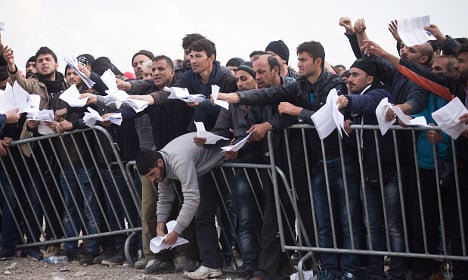“We’re facing a humanitarian catastrophe. The EU needs now to come to Greece’s aid,” the Prime Minister told the Swedish parliament’s EU committee on Friday morning.
Löfven described the continued large influx of refugees as one of the greatest challenges the European Union has ever faced.
“If we’re not able to manage this we actually put the entire EU cooperation at risk,” he said.
The Prime Minister’s comments come ahead of a March 7th summit in Brussels which will see Turkish Prime Minister Ahmet Davutoglu and the leaders of the 28 EU states discuss the progress of last November's EU-Turkey deal aimed at cutting the flow of refugees and migrants.
Under that deal, Turkey agreed to tackle people smugglers and improve conditions for Syrian refugees in exchange for €3 billion and speeding up Ankara's EU membership bid.
But alarm is growing in EU capitals as thousands of people are still reaching the Greek islands from Turkey after more than one million made the perilous journey last year.
“Turkey needs to do more,” said Löfven.
Failure to make progress at the summit will spell “disaster” for the bloc, EU migration commissioner Dimitris Avramopoulos said last week, with its passport-free Schengen zone at risk.
Relations with Turkey have been increasingly tense, with Erdogan even threatening to flood Europe with refugees if Ankara did not get more help during a November visit by Tusk and European Commission chief Jean-Claude Juncker.
Supporting Athens
Speaking in Vienna earlier this week, the President of the European Council, Donald Tusk, said EU members had to “fully apply” the Schengen border code and restore effective controls on the EU's external frontier in Greece.
He said he was “opening a new chapter of our struggle with the migration crisis called 'Back to Schengen'”.
“It's not an easy decision but the truth is there is no alternative to (Schengen),” he said.
“We must face together the humanitarian consequences of our decision. The country which we must support in particular is Greece.”
“A test of our European-ness will be, on the one hand, going back to Schengen, and on the other (having) a readiness to stand by Athens during these hard times.”
But in reference to unilateral new measures by Austria and countries through the western Balkans to limit migrant numbers, Tusk called on EU members to “coordinate more and better”.
“It is natural that important decisions are taken in the capitals but we need to make sure that these decisions are coordinated so they are effective, reinforce each other instead of eroding trust further,” Tusk said in Slovenia.
The tightening of border restrictions has led to a bottleneck of migrants and refugees in Greece, with several thousand stranded on the border with non-EU Macedonia.
On Monday Macedonian police fired tear gas at hundreds of people who tried to break through a border fence.
Sweden extends border checks
Sweden said on Wednesday it was extending the border checks put in place to stem the flow of refugees that saw record numbers apply for asylum last year.
Sweden received 163,000 asylum applications in 2015, however it has seen the number of migrant arrivals fall sharply since it introduced police border controls in November, followed by passenger ID checks at ferry terminals and Copenhagen Airport's train station at the turn of the year.
Between 500 and 600 asylum applications per week are currently being registered, compared with 10,000 in late October.


 Please whitelist us to continue reading.
Please whitelist us to continue reading.